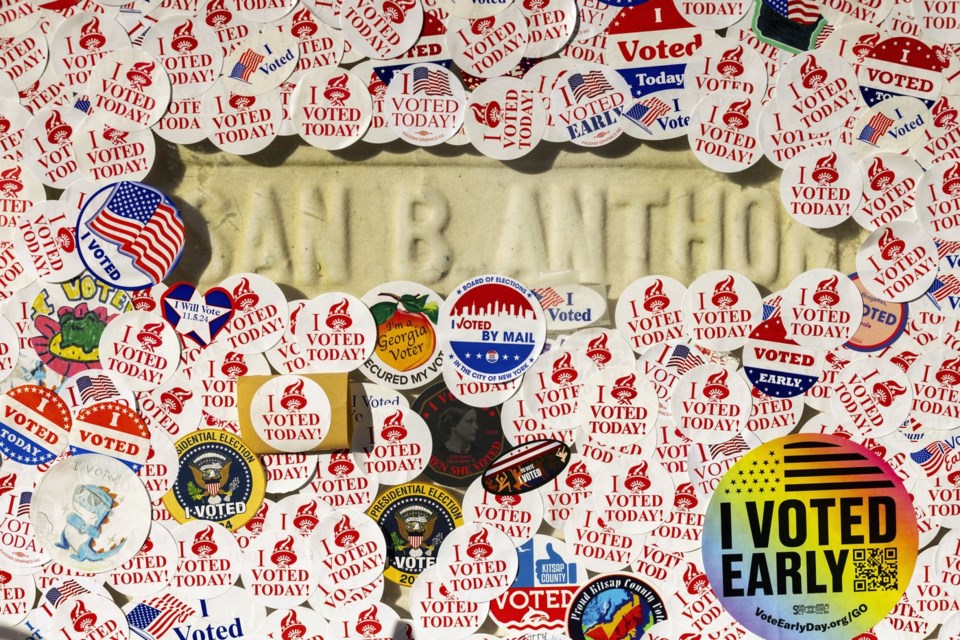ALBANY, N.Y. (AP) — New York voters have approved to the state’s constitution barring discrimination based on things including “gender identity” and “pregnancy outcomes,” changes supporters say will further protect transgender and abortion rights.
Supporters and opponents about the potential legal impact of the Equal Rights Amendment, also known as Proposition 1. It was fiercely opposed by conservatives who said it would enshrine a legal right for transgender athletes to play on girls’ sports teams.
The amendment adds language to the state constitution saying someone cannot be denied civil rights because of their national origin, age, disability, sexual orientation, gender identity, gender expression, pregnancy, pregnancy outcomes or “reproductive healthcare and autonomy.” Previously, the constitution forbid discrimination based on race, creed or religion.
Democratic leaders put the amendment partly in hopes of boosting turnout among voters passionate about protecting abortion access, in an election year when U.S. House races in New York could help decide which party controls Congress.
But the approach Democrats took with the amendment’s language resulted in confusion — and one of the more unusual political fights of the year.
While other states with abortion-related questions on their ballots chose to when exactly ending a pregnancy should be legal, New York lawmakers took the indirect approach of writing their proposed amendment as an antidiscrimination measure.
The intent, they said, was to create a legal framework where any restrictions on abortion would amount to an unconstitutional form of discrimination in medical care. The New York City Bar Association has agreed with that assessment, as have some other legal experts.
“This vote is a rejection of a regressive national movement to roll-back our hard-won freedoms that has gained in other states. New Yorkers resoundingly said ‘hell no, not here’ to abortion bans and attacks on immigrants and trans people,” New York Civil Liberties Union Executive Director Donna Lieberman said in a statement after the amendment passed.
Still, the fact that the amendment itself does not use the word abortion caused headaches for its supporters. It also opened the door for opponents to claim its other antidiscrimination measures would lead to a raft of unintended consequences.
Opponents argued that the amendment’s protection of “gender expression” would create a constitutional right for transgender athletes to play on girls’ sports teams.
They argued that banning discrimination based on national origin could result in noncitizens being allowed to vote and that banning age discrimination might take away price discounts for senior citizens. Some groups argued that it would stop parents from having a say in their child’s medical care.
Previous state court decisions have found that existing language in the state constitution bars noncitizens from voting. And the New York City Bar Association says the amendment would not block existing state laws requiring parental consent for a child’s medical care.
Legal battles are already underway in New York over whether existing state and federal laws give transgender people the right to play on sports teams that match the gender identity.
Democrats in the state legislature voted to put the amendment on the 2024 ballot after the U.S. Supreme Court overturned Roe v. Wade. Voters elsewhere have shown support for abortion access in previous elections. An poll recently found that 7 in 10 Americans think abortion should be legal in all or most cases.
Uncertainty over the New York amendment’s impact on abortion was pronounced enough, however, that it caused even the state Board of Elections to throw up its hands. The board is responsible for writing simple explanations of proposed amendments that voters will see on their ballots. Rather than interpret the measure or include the word abortion in its description, the board decided to reiterate the amendment’s language verbatim.
Supporters of the amendment objected but a judge declined to make the board rewrite its description, in part because he could not say for certain how courts would interpret the amendment’s language when it came to abortion.
Abortion is currently legal in New York through the 24th week of pregnancy. After that, it is only legal if the pregnant person’s life, physical health or mental health is at risk, or if a medical provider determines the fetus is not viable. is a term used by health care providers to describe whether a pregnancy is expected to continue developing normally or whether a fetus might survive outside the uterus. Democrats have firm control of state government in New York, making any new abortion restrictions unlikely in the near future.
But if a future legislature were to try to limit abortion access or, for example, pass a law banning gender-affirming medical care for minors, that’s where supporters of the amendment said it would have its most profound effect. Unlike a state law, which can be repealed by a legislature, an amendment must be passed by lawmakers twice and then go to voters for final approval.
Anthony Izaguirre, The Associated Press


